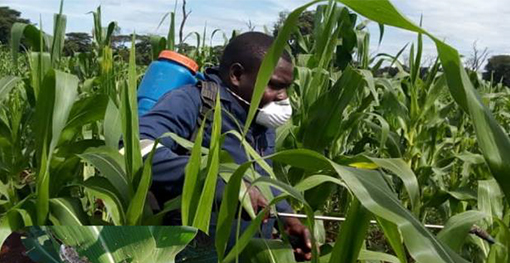- by AATF Africa
Testing of Promising Biopesticides Commence after EAC Sectoral Council of Ministers Adopt Harmonized Regulations
Farmers in the East African region are staring at starvation as a result of pest related losses in maize yield running into millions of USD. Emerging pests such as the Fall Armyworm (FAW) pose a serious threat to crop productivity in Africa, which will further threaten food security. The Centre for Agriculture and Biosciences International (CABI) estimates FAW instigated losses in Africa at USD 2.2-5.5 Billion annually. In East Africa, Tanzania is expected to be the most affected by the destructive pest, with estimated yield loss of up to 3,238,980 tons, ahead of Uganda and Ethiopia with estimated yield losses of 1,391,109 tons and 3,054,727 tons respectively. In Kenya, approximately 250,000 Ha accounting for 11% of the total crop land under maize was attacked by the pest in 2018. To mitigate these negative impacts, experts advocate for multiple pest management strategies blended well into an IPM plan. This could include the use of Bio-Pesticides and biocontrol agents that are able to effectively control FAW.
Luckily, the TAAT Policy compact leveraged on financial support from USDA-FAS to support the process of development of Regionally Harmonized Guidelines for the Registration of Bio-pesticides and Biocontrol Products which were adopted by the Sectoral Council on Agriculture and Food Security (SCAFS in September 2019. The adopted guidelines are meant to facilitate registration of Bio-Pesticides and Bio control agents for plant protection, facilitate the designation of testing centers for pest control products and facilitate the establishment of mechanisms for handling confidential business information (CBI) protection. With these three guidelines, testing and registration of Biopesticides across the region will be made easier because the data used for registration of a product in one country will be acceptable in other EAC partner states hence shortening the period taken to register a product hence making these products accessible to farmers across the EAC region. According to Hon. Christophe Bazivamo, the deputy secretary general in-charge of the productive sectors at the EAC secretariat, passing of these guidelines will have far reaching impacts even beyond the EAC region. “These guidelines are of critical importance to the EAC partner states and will help in the fight against emerging pests such as the FAW and also boost trade relations at continental level as African States seek to implement the African Continental Free Trade Area (AfCFTA)” stated Hon. Bazivamo. The adoption of these regulations in addition to those that govern the testing and registration of conventional pesticides that were adopted earlier earlier-on is already bearing fruit. Pesticide regulators in the EAC region already started receiving dossiers for testing of promising pesticides for the control of FAW from producers/marketers.
According to Dr. Paul Ngaruiya, of the Pest Control Products Board (PCPB) in Kenya indicated that trials for one product were already concluded by December 2019 while season one trials for a second product were underway. Similar testimonials were received from Uganda, Tanzania and Rwanda, where trials for an additional three products were underway. “We are now conducting trials under the harmonized guidelines. Due to the possibility of sharing efficacy trial data, this is going to save the time we need to register a product in the region.” Indicated Mr. Alfred Muzira, who is the Registrar, Crop Inspection and Certification at the Ministry of Agriculture, Animal Industry and Fisheries in the republic of Uganda. However, the impact of these regionally harmonized guidelines will only be felt if the EAC partner states will accelerate the process of their domestication and implementation. TAAT Policy will is determine to provide technical support to the processes that facilitate the domestication of the regionally harmonized regulations such as technical support in conducting efficacy and maximum residual level (MRL) trials to ascertain the effectiveness and safety of the pesticides, development of protocols to guide the trials and through facilitating the establishment of an online platform for information and data sharing among the pesticide regulators in the region.
The TAAT Policy Enabler is one of the Compacts of the Technologies for African Agricultural Transformation (TAAT), a programme of the African Development Bank. The TAAT Policy Enabler is Coordinated by AATF and aims at facilitating the creation of an Enabling environment in support for technology deployment and adoption by farmers in Africa. The Project is implemented jointly with IITA, CORAF and MMI Inc. This story was compiled by Dr. Daniel Kyalo Willy




































































